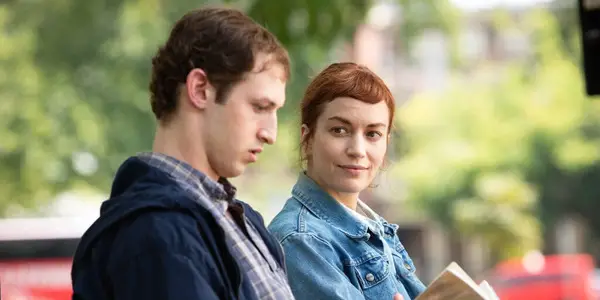After the loss of a loved one, it can seem almost impossible to get through the day. How do you just go back to work, fake a smile, or get through any kind of routine? Do you shut down completely, or open yourself up to the opportunity to feel love again? In Darkest Miriam, we follow the eponymous protagonist through her own struggles with grief, as well as her hopes of love along the way.
Dark Themes With a Light Touch
Miram (Britt Lower) is a librarian with a menagerie of patrons and colleagues. She’s had her share of odd conversations, incident reports, and bodily fluids. Following her father’s death, her life has been a haze of grief, the days blending together among the stacks of returned books and the sound of the piano from the practice room. One day, she meets Janko (Tom Mercier), a cab driver/artist from Slovenia, and the two quickly become attached. All seems well, but at the same time Miriam begins discovering notes throughout the library: cryptic, threatening, and describing her exactly. Who is sending these? And will it get in the way of her newly-discovered happiness?

Physical attraction aside, it’s clear why these two would come together: Miriam and Janko are two souls, swathed in darkness, ambling through life. She’s drawn to the darkness in books, as he is to the dreariness of his art. In each other, though, they find comfort and joy. Lower gives a delicate, touching performance as a woman just barely holding it together as she struggles internally. It is with her that Darkest Miriam has its brightest moments, enhanced by Louie Short and Eliza Niemi’s score, in addition to the use of classical pieces. Mercier plays Janko more understated, yet also direct in his conversations with Miriam and his questions about her life, and the entire supporting ensemble plays their parts so well, I feel like I know this library somewhere downtown.
The film starts out like a quirky dramedy from the mid-2000s, with elements of Wes Anderson or Jason Reitman. The tone is slightly offbeat, with touches of humor in the odd experiences such as, say, finding dentures on a shelf. As the story continues the comedy is quietly dropped to make room for the drama, which works in its own way. However, in the letters, there is the start of a thriller that never quite seems to take off. There’s a level of concern that doesn’t fully escalate, and the stakes of which seem to plateau, downgrading fear to more of a morbid curiosity. Where the story may lose its footing, it is bolstered by its tone. Writer-director Naomi Jaye, who won the Fantasia International Film Festival’s DGC Award for Best Director, imbues the film with a vibe that’s at times dreamlike, others grounded, but we always feel the emotional weight Miriam carries along with her.
Darkest Miriam: Shades of Gray
Though it doesn’t fully live up to the thriller element, Darkest Miriam is still an interesting romantic drama. The characters are well-written, and its most engaging moments are when we are allowing them to show us who they are, opening themselves up to the vulnerability in loss with which we’re all too familiar.
Darkest Miriam is available via VOD starting April 15.
Does content like this matter to you?
Become a Member and support film journalism. Unlock access to all of Film Inquiry`s great articles. Join a community of like-minded readers who are passionate about cinema - get access to our private members Network, give back to independent filmmakers, and more.